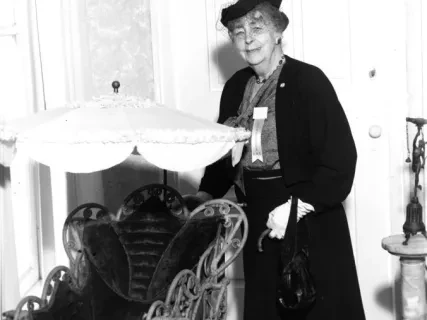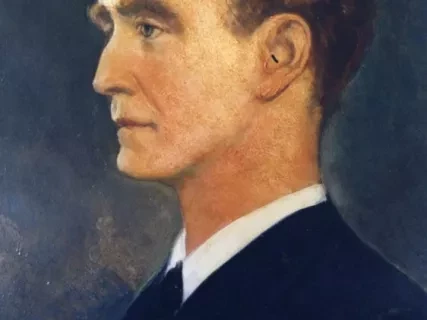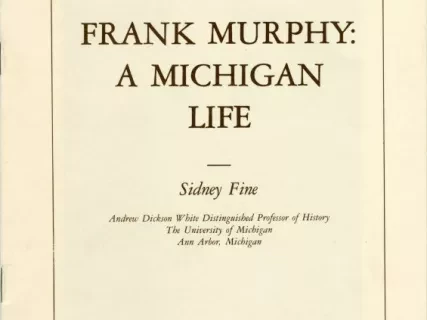Murphy, Frank T.
Born
4/13/1893
Birthplace
Harbor Beach, Michigan
Titles and Honors
US Attorney General
Mayor of Detroit
Governor of Michigan
Attorney General
Frank Murphy Hall of Justice was named for him (Detroit).
Mayor of Detroit
Governor of Michigan
Attorney General
Frank Murphy Hall of Justice was named for him (Detroit).
Education
Attended the University of Michigan graduating with LLB in 1913.
Lincoln Inn, London
Trinity College, Dublin
Lincoln Inn, London
Trinity College, Dublin
Notes
Frank Murphy was on April 13, 1890 in Harbor Beach, Michigan. He attended the University of Michigan, earning his law degree in 1914. He served as an infantry captain in France during World War I and returned to be appointed Chief Assistant U.S. Attorney in Detroit. Murphy served as a judge of the Recorder's Court during the Prohibition Era (Prohibition in the United States was the ear during which the United States Constitution outlawed the manufacture, transportation, and sale of alcoholic beverages, 1920-1933.) His best known trials were the two murder trials of Dr. Ossian Sweet, an African- American charged with the murder of a white man. Sweet had moved his family to a white neighborhood in Detroit; the victim had been shot in a mob of whites assembled outside the Sweet home. Judge Murphy's fairness to the prosecution and defense was remarkable; his fairness to the defendant was unique for the times. He faced the city's growing culture of cars by working to create an independent Traffic Court. With a view of probation as a form of social service, he established a professional, nonpolitical probation department as an arm if the court.
Murphy served as mayor for the city of Detroit during the first years of the Depression, from 1930-1933. He presided over an epidemic of urban unemployment, a crisis in which 100,000 people were unemployed in the summer of 1931. He named an unemployment committee of private citizens from business, churches, and labor and social service organizations to identify all residents who were unemployed and not receiving welfare benefits. Mayor Murphy struggled to provide housing to thousands of homeless people through emergency shelters and kitchens. His Department of Public Works ran work relief programs in which thousands of welfare recipients worked for their benefits. Murphy won election as Michigan's governor in 1936, at a time of extreme turmoil in labor relations. When Governor Murphy took office on January 1, 1937, more than 100,000 GM workers were in the third day of a sit-down strike in Flint. His determination in the matter was driven by his view that the workers' individual rights were every bit as important as corporate property rights. He succeeded in forcing the parties to negotiate their differences and end the sit-down strike. In 1939, President Roosevelt nominated Governor Murphy to serve as U.S. Attorney General. Murphy established a Civil Liberties Section in the Criminal Division of the Department of Justice. The section was designed to centralize enforcement responsibility for the Bill of Rights and civil rights statues. Justice Murphy's service on the Supreme Court for nine years from 1940-1949, marked his place as a champion of equal justice.
Murphy served as mayor for the city of Detroit during the first years of the Depression, from 1930-1933. He presided over an epidemic of urban unemployment, a crisis in which 100,000 people were unemployed in the summer of 1931. He named an unemployment committee of private citizens from business, churches, and labor and social service organizations to identify all residents who were unemployed and not receiving welfare benefits. Mayor Murphy struggled to provide housing to thousands of homeless people through emergency shelters and kitchens. His Department of Public Works ran work relief programs in which thousands of welfare recipients worked for their benefits. Murphy won election as Michigan's governor in 1936, at a time of extreme turmoil in labor relations. When Governor Murphy took office on January 1, 1937, more than 100,000 GM workers were in the third day of a sit-down strike in Flint. His determination in the matter was driven by his view that the workers' individual rights were every bit as important as corporate property rights. He succeeded in forcing the parties to negotiate their differences and end the sit-down strike. In 1939, President Roosevelt nominated Governor Murphy to serve as U.S. Attorney General. Murphy established a Civil Liberties Section in the Criminal Division of the Department of Justice. The section was designed to centralize enforcement responsibility for the Bill of Rights and civil rights statues. Justice Murphy's service on the Supreme Court for nine years from 1940-1949, marked his place as a champion of equal justice.
Occupation
Lawyer, 1916-1917
Captain of Infantry, 1917-1919
Chief Assistant U.S. District Attorney, Eastern District, Michigan, 1920-1923
Instructor of Law, University of Detroit, 1922-1927
Judge, Recorder's Court, Detroit, 1923-1930
Mayor of Detroit, 1930-1933
Govenor-General of Phillippine Island; U.S. High Commissioner to Phillippine Island, 1935-1936
Governor, State of Michigan, 1936
Attorny General of U.S., 1940-1949
Captain of Infantry, 1917-1919
Chief Assistant U.S. District Attorney, Eastern District, Michigan, 1920-1923
Instructor of Law, University of Detroit, 1922-1927
Judge, Recorder's Court, Detroit, 1923-1930
Mayor of Detroit, 1930-1933
Govenor-General of Phillippine Island; U.S. High Commissioner to Phillippine Island, 1935-1936
Governor, State of Michigan, 1936
Attorny General of U.S., 1940-1949
Father
John F. Murphy
Mother
Mary Brennan
Nationality
American
Related Records

Print, Photographic
2013.041.267Photo

Print, Photographic
2013.048.164Photo

